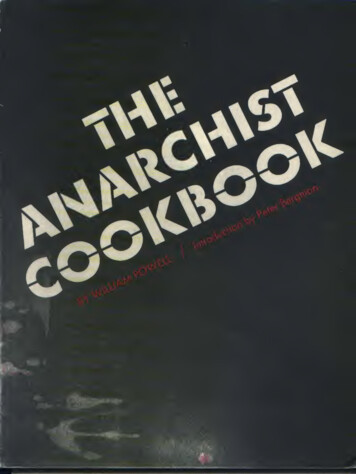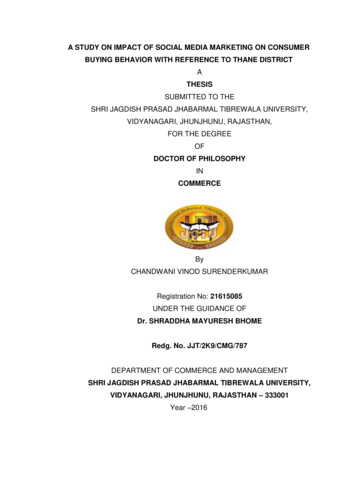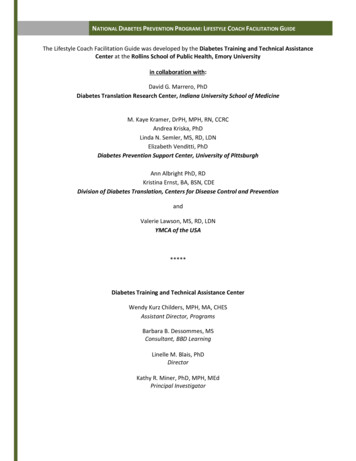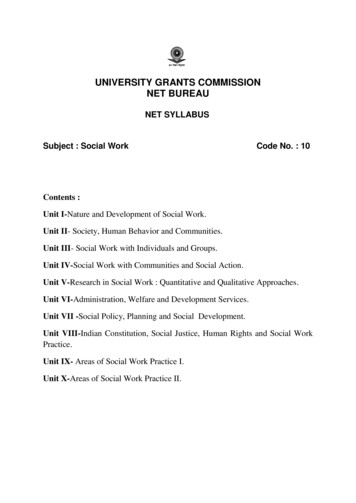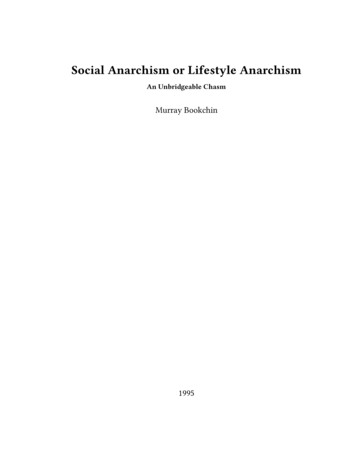
Transcription
Social Anarchism or Lifestyle AnarchismAn Unbridgeable ChasmMurray Bookchin1995
ContentsPart 13Individualist Anarchism and Reaction7Part 210Autonomy or Freedom?11Part 316Anarchism as Chaos17Mystical and Irrationalist Anarchism22Part 424Against Technology and Civilization25Part 530Mystifying the Primitive31Part 640Evaluating Lifestyle Anarchism41Toward a Democratic Communalism462
Part 1
For some two centuries, anarchism — a very ecumenical body of anti-authoritarian ideas —developed in the tension between two basically contradictory tendencies: a personalistic commitment to individual autonomy and a collectivist commitment to social freedom. These tendencieshave by no means been reconciled in the history of libertarian thought. Indeed, for much of thelast century, they simply coexisted within anarchism as a minimalist credo of opposition to theState rather than as a maximalist credo that articulated the kind of new society that had to becreated in its place.Which is not to say that various schools of anarchism did not advocate very specific formsof social organization, albeit often markedly at variance with one another. Essentially, however,anarchism as a whole advanced what Isaiah Berlin has called ‘negative freedom,’ that is to say, aformal ‘freedom from,’ rather than a substantive ‘freedom to.’ Indeed, anarchism often celebratedits commitment to negative freedom as evidence of its own pluralism, ideological tolerance, orcreativity — or even, as more than one recent postmodernist celebrant has argued, its incoherence.Anarchism’s failure to resolve this tension, to articulate the relationship of the individual tothe collective, and to enunciate the historical circumstances that would make possible a statelessanarchic society produced problems in anarchist thought that remain unresolved to this day.Pierre Joseph Proudhon, more than many anarchists of his day, attempted to formulate a fairlyconcrete image of a libertarian society. Based on contracts, essentially between small producers,cooperatives, and communes, Proudhon’s vision was redolent of the provincial craft world intowhich he was born. But his attempt to meld a patroniste, often patriarchal notion of liberty withcontractual social arrangements was lacking in depth. The craftsman, cooperative, and commune,relating to one another on bourgeois contractual terms of equity or justice rather than on thecommunist terms of ability and needs, reflected the artisan’s bias for personal autonomy, leavingany moral commitment to a collective undefined beyond the good intentions of its members.Indeed, Proudhon’s famous declaration that ‘whoever puts his hand on me to govern me isan usurper and a tyrant; I declare him my enemy’ strongly tilts toward a personalistic, negativefreedom that overshadows his opposition to oppressive social institutions and the vision of ananarchist society that he projected. His statement easily blends into William Godwin’s distinctlyindividualistic declaration: ‘There is but one power to which I can yield a heartfelt obedience,the decision of my own understanding, the dictates of my own conscience.’ Godwin’s appeal tothe ‘authority’ of his own understanding and conscience, like Proudhon’s condemnation of the‘hand’ that threatens to restrict his liberty, gave anarchism an immensely individualistic thrust.Compelling as such declarations may be — and in the United States they have won considerable admiration from the so-called libertarian (more accurately, proprietarian) right, with itsavowals of ‘free’ enterprise — they reveal an anarchism very much at odds with itself. By contrast, Michael Bakunin and Peter Kropotkin held essentially collectivist views — in Kropotkin’scase, explicitly communist ones. Bakunin emphatically prioritized the social over the individual.Society, he writes,antedates and at the same time survives every human individual, being in this respectlike Nature itself. It is eternal like Nature, or rather, having been born upon our earth,it will last as long as the earth. A radical revolt against society would therefore bejust as impossible for man as a revolt against Nature, human society being nothingelse but the last great manifestation or creation of Nature upon this earth. And an4
individual who would want to rebel against society would place himself beyondthe pale of real existence.1Bakunin often expressed his opposition to the individualistic trend in liberalism and anarchismwith considerable polemical emphasis. Although society is ‘indebted to individuals,’ he wrote ina relatively mild statement, the formation of the individual is social:even the most wretched individual of our present society could not exist and developwithout the cumulative social efforts of countless generations. Thus the individual,his freedom and reason, are the products of society, and not vice versa: society is notthe product of individuals comprising it; and the higher, the more fully the individualis developed, the greater his freedom — and the more he is the product of society,the more does he receive from society and the greater his debt to it.2Kropotkin, for his part, retained this collectivistic emphasis with remarkable consistency. Inwhat was probably his most widely read work, his Encyclopaedia Britannica essay on ‘Anarchism,’ Kropotkin distinctly located the economic conceptions of anarchism on the ‘left-wing’of ‘all socialisms,’ calling for the radical abolition of private property and the State in ‘the spiritof local and personal initiative, and of free federation from the simple to the compound, in lieuof the present hierarchy from the center to the periphery.’ Kropotkin’s works on ethics, in fact,include a sustained critique of liberalistic attempts to counterpose the individual to society, indeed to subordinate society to the individual or ego. He placed himself squarely in the socialisttradition. His anarchocommunism, predicated on advances in technology and increased productivity, became a prevailing libertarian ideology in the 1890s, steadily elbowing out collectivistnotions of distribution based on equity. Anarchists, ‘in common with most socialists,’ Kropotkinemphasized, recognized the need for ‘periods of accelerated evolution which are called revolutions,’ ultimately yielding a society based on federations of ‘every township or commune of thelocal groups of producers and consumers.3With the emergence of anarchosyndicalism and anarcho-communism in the late nineteenthand early twentieth century, the need to resolve the tension between the individualist and thecollectivist tendencies essentially became moot. Anarcho-individualism was largely marginalizedby mass socialistic workers’ movements, of which most anarchists considered themselves the leftwing. In an era of stormy social upheaval, marked by the rise of a mass working-class movementthat culminated in the 1930s and the Spanish Revolution, anarchosyndicalists and anarchocommunists, no less than Marxists, considered anarcho-individualism to be petty-bourgeois exotica.They often attacked it quite directly as a middle-class indulgence, rooted far more in liberalismthan in anarchism.The period hardly allowed individualists, in the name of their ‘uniqueness,’ to ignore the needfor energetic revolutionary forms of organization with coherent and compelling programs. Farfrom indulging in Max Stirner’s metaphysics of the ego and its ‘uniqueness,’ anarchist activistsrequired a basic theoretical, discursive, and programmatically oriented literature, a need that1The Political Philosophy of Bakunin, G. P. Maximoff editor (Glencoe, Ill.: Free Press, 1953), p.144.Political Philosophy of Bakunin, p.158.3Peter Kropotkin, ‘Anarchism,’ the Encyclopaedia Britannica article, in Kropotkin’s Revolutionary Pamphlets, ed.Roger N. Baldwin (New York: Dover Publications, 1970), pp.285–87.25
was filled by, among others, Kropotkin’s The Conquest of Bread (London, 1913), Diego Abad deSantillán’s El organismo económico de la revolución (Barcelona, 1936), and G. P. Maximoff’s ThePolitical Philosophy of Bakunin (English publication in 1953, three years after Maximoff’s death;the date of original compilation, not provided in the English translation, may have been years,even decades earlier). No Stirnerite ‘Union of Egoists,’ to my knowledge, ever rose to prominence— even assuming such a union could be established and survive the ‘uniqueness’ of its egocentricparticipants.6
Individualist Anarchism and ReactionTo be sure, ideological individualism did not fade away altogether during this period of sweeping social unrest. A sizable reservoir of individualist anarchists, especially in the Anglo-Americanworld, were nourished by the ideas of John Locke and John Stuart Mill, as well as Stirner himself.Home-grown individualists with varying degrees of commitment to libertarian views littered theanarchist horizon. In practice, anarcho-individualism attracted precisely individuals, from Benjamin Tucker in the United States, an adherent of a quaint version of free competition, to FedericaMontseny in Spain, who often honored her Stirnerite beliefs in the breach. Despite their avowalsof an anarchocommunist ideology, Nietzscheans like Emma Goldman remained cheek to jowl inspirit with individualists.Hardly any anarcho-individualists exercised an influence on the emerging working class. Theyexpressed their opposition in uniquely personal forms, especially in fiery tracts, outrageous behavior, and aberrant lifestyles in the cultural ghettos of fin de siècle New York, Paris, and London.As a credo, individualist anarchism remained largely a bohemian lifestyle, most conspicuous inits demands for sexual freedom (‘free love’) and enamored of innovations in art, behavior, andclothing.It was in times of severe social repression and deadening social quiescence that individualistanarchists came to the foreground of libertarian activity — and then primarily as terrorists. InFrance, Spain, and the United States, individualistic anarchists committed acts of terrorism thatgave anarchism its reputation as a violently sinister conspiracy. Those who became terroristswere less often libertarian socialists or communists than desperate men and women who usedweapons and explosives to protest the injustices and philistinism of their time, putatively in thename of ‘propaganda of the deed.’ Most often, however, individualist anarchism expressed itselfin culturally defiant behavior. It came to prominence in anarchism precisely to the degree thatanarchists lost their connection with a viable public sphere.Today’s reactionary social context greatly explains the emergence of a phenomenon in EuroAmerican anarchism that cannot be ignored: the spread of individualist anarchism. In a timewhen even respectable forms of socialism are in pell-mell retreat from principles that might inany way be construed as radical, issues of lifestyle are once again supplanting social action andrevolutionary politics in anarchism. In the traditionally individualist-liberal United States andBritain, the 1990s are awash in self-styled anarchists who — their flamboyant radical rhetoricaside — are cultivating a latter-day anarcho-individualism that I will call lifestyle anarchism. Itspreoccupations with the ego and its uniqueness and its polymorphous concepts of resistance aresteadily eroding the socialistic character of the libertarian tradition. No less than Marxism andother socialisms, anarchism can be profoundly influenced by the bourgeois environment it professes to oppose, with the result that the growing ‘inwardness’ and narcissism of the yuppie generation have left their mark upon many avowed radicals. Ad hoc adventurism, personal bravura,an aversion to theory oddly akin to the antirational biases of postmodernism, celebrations oftheoretical incoherence (pluralism), a basically apolitical and anti-organizational commitment7
to imagination, desire, and ecstasy, and an intensely self-oriented enchantment of everyday life,reflect the toll that social reaction has taken on Euro-American anarchism over the past twodecades.During the 1970s, writes Katinka Matson, the compiler of a compendium of techniques forpersonal psychological development, there occurred ‘a remarkable change in the way we perceiveourselves in the world. The 1960s,’ she continues, ‘saw a preoccupation with political activism,Vietnam, ecology, be-ins, communes, drugs, etc.’ Today we are turning inward: we are looking forpersonal definition, personal improvement, personal achievement, and personal enlightenment.1Matson’s noxious little bestiary, compiled for Psychology Today magazine, covers every techniquefrom acupuncture to the I Ching, from est to zone therapy. In retrospect, she might well haveincluded lifestyle anarchism in her compendium of inward-looking soporifics, most of whichfoster ideas of individual autonomy rather than social freedom. Psychotherapy in all its mutationscultivates an inwardly directed ‘self’ that seeks autonomy in a quiescent psychological conditionof emotional self-sufficiency — not the socially involved self denoted by freedom. In lifestyleanarchism as in psychotherapy, the ego is counterposed to the collective; the self, to society; thepersonal, to the communal.The ego — more precisely, its incarnation in various lifestyles — has become an idée fixe formany post-1960s anarchists, who are losing contact with the need for an organized, collectivistic, programmatic opposition to the existing social order. Invertebrate ‘protests,’ directionlessescapades, self-assertions, and a very personal ‘recolonization’ of everyday life parallel the psychotherapeutic, New Age, self-oriented lifestyles of bored baby boomers and members of Generation X. Today, what passes for anarchism in America and increasingly in Europe is little morethan an introspective personalism that denigrates responsible social commitment; an encountergroup variously renamed a ‘collective’ or an ‘affinity group’; a state of mind that arrogantly derides structure, organization, and public involvement; and a playground for juvenile antics.Consciously or not, many lifestyle anarchists articulate Michel Foucault’s approach of ‘personal insurrection’ rather than social revolution, premised as it is on an ambiguous and cosmiccritique of power as such rather than on a demand for the institutionalized empowerment of theoppressed in popular assemblies, councils, and/or confederations. To the extent that this trendrules out the real possibility of social revolution — either as an ‘impossibility’ or as an ‘imaginary’ — it vitiates socialistic or communistic anarchism in a fundamental sense. Indeed, Foucaultfosters a perspective that ‘resistance is never in a position of exteriority in relation to power Hence there is no single [read: universal] locus of great Refusal, no soul of revolt, source of allrebellions, or pure law of the revolutionary.’ Caught as we all are in the ubiquitous embrace of apower so cosmic that, Foucault’s overstatements and equivocations aside, resistance becomes entirely polymorphous, we drift futilely between the ‘solitary’ and the ‘rampant.’2 His meanderingideas come down to the notion that resistance must necessarily be a guerrilla war that is alwayspresent — and that is inevitably defeated.Lifestyle, like individualist, anarchism bears a disdain for theory, with mystical, and primitivistic filiations that are generally too vague, intuitional, and even antirational to analyze directly.1Katinka Matson, ‘Preface,’ The Psychology Today Omnibook of Personal Development (New York: William Morrow & Co., 1977), n.p.2Michel Foucault, The History of Sexuality, vol. 1, translated by Robert Hurley (New York: Vintage Books, 1990),pp.95–96. Heavenly will be the day when one can get straightforward formulations from Foucault, interpretations ofwhose views are often contradictory.8
They are more properly symptoms than causes of the general drift toward a sanctification of theself as a refuge from the existing social malaise. Nonetheless, largely personalistic anarchismsstill have certain muddy theoretical premises that lend themselves to critical examination.Their ideological pedigree is basically liberal, grounded in the myth of the fully autonomousindividual whose claims to self-sovereignty are validated by axiomatic ‘natural rights,’ ‘intrinsicworth,’ or, on a more sophisticated level, an intuited Kantian transcendental ego that is generativeof all knowable reality. These traditional views surface in Max Stirner’s ‘I’ or ego, which shareswith existentialism a tendency to absorb all of reality into itself, as if the universe turned on thechoices of the self-oriented individual.More recent works on lifestyle anarchism generally sidestep Stirner’s sovereign, allencompassing ‘I,’ albeit retaining its egocentric emphasis, and tend toward existentialism,recycled Situationism, Buddhism, Taoism, antirationalism, and primitivism — or, quite ecumenically, all of them in various permutations. Their commonalities, as we shall see, are redolent of aprelapsarian return to an original, often diffuse, and even petulantly infantile ego that ostensiblyprecedes history, civilization, and a sophisticated technology — possibly language itself — andthey have nourished more than one reactionary political ideology over the past century.9
Part 2
Autonomy or Freedom?Without falling into the trap of social constructionism that sees every category as a productof a given social order, we are obliged to ask for a definition of the ‘free individual.’ How doesindividuality come into being, and under what circumstances is it free?When lifestyle anarchists call for autonomy rather than freedom, they thereby forfeit the richsocial connotations of freedom. Indeed, today’s steady anarchist drumbeat for autonomy ratherthan social freedom cannot be dismissed as accidental, particularly in Anglo-American varietiesof libertarian thought, where the notion of autonomy more closely corresponds to personal liberty. Its roots lie in the Roman imperial tradition of libertas, wherein the untrammeled ego is‘free’ to own his personal property — and to gratify his personal lusts. Today, the individual endowed with ‘sovereign rights’ is seen by many lifestyle anarchists as antithetical not only to theState but to society as such. Strictly defined, the Greek word autonomia means ‘independence,’connoting a self-managing ego, independent of any clientage or reliance on others for its maintenance. To my knowledge, it was not widely used by the Greek philosophers; indeed, it is not evenmentioned in F. E. Peters’s historical lexicon of Greek Philosophical Terms. Autonomy, like liberty,refers to the man (or woman) who Plato would have ironically called the ‘master of himself,’ acondition ‘when the better principle of the human soul controls the worse.’ Even for Plato, theattempt to achieve autonomy through mastery of oneself constituted a paradox, ‘for the masteris also the servant and the servant the master, and in all these modes of speaking the same personis predicated’ (Republic, book 4, 431). Characteristically, Paul Goodman, an essentially individualistic anarchist, maintained that ‘for me, the chief principle of anarchism is not freedom butautonomy, the ability to initiate a task and do it one’s own way’ — a view worthy of an aesthetebut not of a social revolutionary.1While autonomy is associated with the presumably self-sovereign individual, freedom dialectically interweaves the individual with the collective. The word freedom has its analogue inthe Greek eleutheria and derives from the German Freiheit, a term that still retains a gemeinsch’ftliche or communal ancestry in Teutonic tribal life and law. When applied to the individual,freedom thus preserves a social or collective interpretation of that individual’s origins and development as a self. In ‘freedom,’ individual selfhood does not stand opposed to or apart from thecollective but is significantly formed — and in a rational society, would be realized — by his orher own social existence. Freedom thus does not subsume the individual’s liberty but denotes itsactualization.The confusion between autonomy and freedom is all too evident in L. Susan Brown’s ThePolitics of Individualism (POI), a recent attempt to articulate and elaborate a basically individualistanarchism, yet retain some filiations with anarcho’communism.2 If lifestyle anarchism needs an1Paul Goodman, ‘Politics Within Limits,’ in Crazy Hope and Finite Experience: Final Essays of Paul Goodman, ed.Taylor Stoehr (San Francisco: Jossey-Bass, 1994), p.56.2L. Susan Brown, The Politics of Individualism (Montreal: Black Rose Books, 1993). Brown’s hazy commitmentto anarchocommunism seems to derive more from a visceral preference than from her analysis.11
academic pedigree, it will find it in her attempt to meld Bakunin and Kropotkin with John StuartMill. Alas, herein lies a problem that is more than academic. Brown’s work exhibits the extent towhich concepts of personal autonomy stand at odds with concepts of social freedom. In essence,like Goodman she interprets anarchism as a philosophy not of social freedom but of personalautonomy. She then offers a notion of ‘existential individualism’ that she contrasts sharply bothwith ‘instrumental individualism’ (or C. B. Macpherson’s ‘possessive [bourgeois] individualism’)and with ‘collectivism’ — leavened with extensive quotations from Emma Goldman, who was byno means the ablest thinker in the libertarian pantheon.Brown’s ‘existential individualism’ shares liberalism’s ‘commitment to individual autonomyand self-determination,’ she writes (POI, p.2). ‘While much of anarchist theory has been viewed ascommunist by anarchists and non-anarchists alike,’ she observes, ‘what distinguishes anarchismfrom other communist philosophies is anarchism’s uncompromising and relentless celebration ofindividual self-determination and autonomy. To be an anarchist — whether communist, individualist, mutualist, syndicalist, or feminist — is to affirm a commitment to the primacy of individualfreedom’ (POI, p.2) — and here she uses the word freedom in the sense of autonomy. Althoughanarchism’s ‘critique of private property and advocacy of free communal economic relations’(POI, p.2) move Brown’s anarchism beyond liberalism, it nonetheless upholds individual rightsover — and against — those of the collective.‘What distinguishes [existential individualism] from the collectivist point of view,’ Brown goeson, ‘is that individualists’ — anarchists no less than liberals — ‘believe in the existence of an internally motivated and authentic free will, while most collectivists understand the human individualas shaped externally by others — the individual for them is ‘constructed’ by the collective’ (POI,p.12, emphasis added). Essentially, Brown dismisses collectivism — not just state socialism, butcollectivism as such — with the liberal canard that a collectivist society entails the subordination of the individual to the group. Her extraordinary suggestion that ‘most collectivists’ haveregarded individual people as ‘simply human flotsam and jetsam swept along in the current ofhistory’ (POI, p.12) is a case in point. Stalin certainly held this view, and so did many Bolsheviks,with their hypostasization of social forces over individual desires and intentions. But collectivistsas such? Are we to ignore the generous traditions of collectivism that sought a rational, democratic, and harmonious society — the visions of William Morris, say, or Gustav Landauer? Whatabout Robert Owen, the Fourierists, democratic and libertarian socialists, Social Democrats of anearlier era, even Karl Marx and Peter Kropotkin? I am not sure that ‘most collectivists,’ even thosewho are anarchists, would accept the crude determinism that Brown attributes to Marx’s socialinterpretations. By creating straw ‘collectivists’ who are hard-line mechanists, Brown rhetorically counterposes a mysteriously and autogenetically constituted individual, on the one hand,with an omnipresent, presumably oppressive, even totalitarian collective, on the other. Brown,in effect, overstates the contrast between ‘existential individualism’ and the beliefs of ‘most collectivists’ — to the point where her arguments seem misguided at best or disingenuous at worst.It is elementary that, Jean-Jacques Rousseau’s ringing opening to the Social Contract notwithstanding, people are definitely not ‘born free,’ let alone autonomous. Indeed, quite to the contrary,they are born very unfree, highly dependent, and conspicuously heteronomous. What freedom,independence, and autonomy people have in a given historical period is the product of long social traditions and, yes, a collective development — which is not to deny that individuals play animportant role in that development, indeed are ultimately obliged to do so if they wish to be free.12
Brown’s argument leads to a surprisingly simplistic conclusion. ‘It is not the group that givesshape to the individual,’ we are told, ‘but rather individuals who give form and content to thegroup. A group is a collection of individuals, no more and no less; it has no life or consciousness ofits own’ (POI, p.12, emphasis added). Not only does this incredible formulation closely resembleMargaret Thatcher’s notorious statement that there is no such thing as a society but only individuals; it attests to a positivistic, indeed naive social myopia in which the universal is whollyseparated from the concrete. Aristotle, one would have thought, resolved this problem when hechided Plato for creating a realm of ineffable ‘forms’ that existed apart from their tangible andimperfect ‘copies.’It remains true that individuals never form mere ‘collections’ — except perhaps in cyberspace;quite to the contrary, even when they seem atomized and hermetic, they are immensely definedby the relationships they establish or are obliged to establish with each other, by virtue of theirvery real existence as social beings. The idea that a collective — and by extrapolation, society —is merely a ‘collection of individuals, no more and no less’ represents an ‘insight’ into the natureof human consociation that is hardly liberal but, today particularly, potentially reactionary.By insistently identifying collectivism with an implacable social determinism, Brown herselfcreates an abstract ‘individual,’ one that is not even existential in the strictly conventional senseof the word. Minimally, human existence presupposes the social and material conditions necessary for the maintenance of life, sanity, intelligence, and discourse; and the affective qualitiesBrown regards as essential for her voluntaristic form of communism: care, concern, and sharing.Lacking the rich articulation of social relationships in which people are embedded from birththrough maturity to old age, a ‘collection of individuals’ such as Brown posits would be, to put itbluntly, not a society at all. It would be literally a ‘collection’ in Thatcher’s sense of free-booting,self-seeking, egoistic monads. Presumably complete unto themselves, they are, by dialectical inversion, immensely de-individuated for want of any aim beyond the satisfaction of their ownneeds and pleasures — which are often socially engineered today in any case.Acknowledging that individuals are self-motivated and possess free will does not require usto reject collectivism, given that they are also capable of developing an awareness of the socialconditions under which these eminently human potentialities are exercised. The attainment offreedom rests partly on biological facts, as anyone who has raised a child knows; partly, on socialfacts, as anyone who lives in a community knows; and contrary to social constructionists, partlyon the interaction of environment and inborn personal proclivities, as any thinking person knows.Individuality did not spring into being ab novo. Like the idea of freedom, it has a long social andpsychological history.Left to his or her own self, the individual loses the indispensable social moorings that makefor what an anarchist might be expected to prize in individuality: reflective powers, which derivein great part from discourse; the emotional equipment that nourishes rage against unfreedom;the sociality that motivates the desire for radical change; and the sense of responsibility thatengenders social action.Indeed, Brown’s thesis has disturbing implications for social action. If individual ‘autonomy’overrides any commitment to a ‘collectivity,’ there is no basis whatever for social institutionalization, decision-making, or even administrative coordination. Each individual, self-contained inhis or her ‘autonomy,’ is free to do whatever he or she wants — presumably, following the old liberal formula, if it does not impede the ‘autonomy’ of others. Even democratic decision-makingis jettisoned as authoritarian. ‘Democratic rule is still rule,’ Brown warns. ‘While it allows for13
more individual participation in government than monarchy or totalitarian dictatorship, it stillinherently involves the repression of the wills of some people. This is obviously at odds with theexistential individual, who must maintain the integrity of will in order to be existentially free’(POI, p.53). Indeed, so transcendentally sacrosanct is the autonomous individual will, in Brown’seyes, that she approvingly quotes Peter Marshall’s claim that, according to anarchist principles,‘the majority has no more right to dictate to the minority, even a minority of one, than the minority to the majority’ (POI, p.140, emphasis added).Denigrating rational, discursive, and direct-democratic procedures for collective decisionmaking as ‘dictating’ and ‘ruling’ awards a minority of one sovereign ego the right to abort thedecision of a majority. But the fact remains that a free society will either be democratic, or itwill not be achiev
Contents Part1 3 IndividualistAnarchismandReaction 7 Part2 10 AutonomyorFreedom? 11 Part3 16

